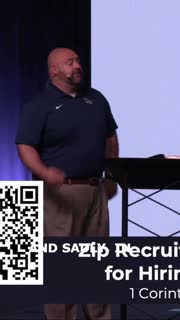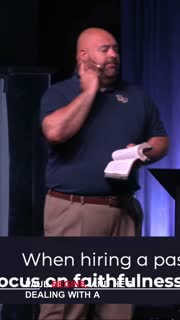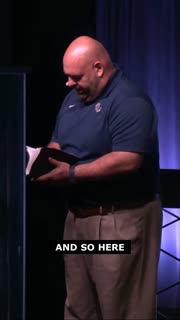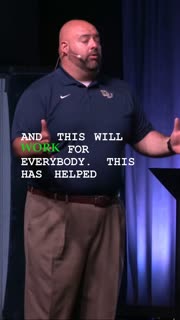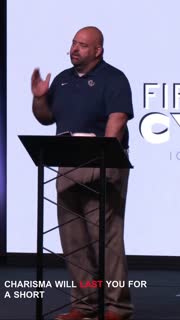Choosing Godly Leaders: Faithfulness Over Worldly Standards
Devotional
Sermon Summary
Bible Study Guide
Sermon Clips
1) "And sadly, in America today, in churches today, we've adopted the Corinthian model. We've adopted this model that we are to look for the rich and the powerful, the smartest, the most eloquent we look for a style of a leader who will serve more as a ceo than as a shepherd and we say that's what we need we look to some of the largest churches in america and we see clean cut and and very designer oriented pastors who seemingly live lavishly on the backs of their people and sadly because we don't know the word we assume because their churches are filled that that's what god's looking for that that's how god defines success but this morning we are going to see that god is looking for people to fill roles now in our world we go to places like zip recruiter to find our new employees zip recruiter boasts some pretty great numbers nine million job openings they have fulfilled three million of them and they will say that they know exactly what you need to be successful in your job search and so they're going to run you through this whole gamut of things that's going to define the kind of leader the kind of employee that you need to be and they're going to help you as a company find the exact one well here's the thing zip recruiter doesn't really work great for churches because we don't uh address them from a worldly standpoint we need god to speak and do who we find who is our leader who is going to lead this church and what characteristics and what qualities are there and he in these 13 verses establishes the kind of leaders that we need and he does so by giving us three things that I want to, if you will, kind of funnel our thoughts through this morning about what we should look for in a leader this morning." [03:20] (141 seconds)
2) "Paul begins, and he's dealing with a problem. All of 1 Corinthians is one big problem. This church has got a lot of issues. And Paul begins this part of it saying, you're picking the wrong leaders. In the next chapter, we're going to get to a place where they're going to kick out one of their leaders because of gross sexual immorality. Such a gross immorality that not even the pagans were engaged in that type of thing. He was sleeping with immorality. He was sleeping with immorality. He was sleeping with immorality. He was sleeping with immorality. He was sleeping with immorality. He was sleeping with immorality. He was sleeping with immorality. He was sleeping with immorality. He was sleeping in law or his stepmom. And he was a leader within the church. And so Paul's preparing them that you're picking all the wrong leaders. You're picking them because your set of expectations is all wrong. And what Paul is communicating to us is he says, listen, church leadership is really important. As you set up the leaders, so goes the church. And so we need to know and recognize what type of leaders, what type of pastors should we be looking for? And notice what he says. The first thing he says about our leaders is that they need to be servants." [07:10] (73 seconds)
3) "Paul is talking about a certain type of servant. Literally, it would be rendered an under -reaching servant. It would be rendered an under -reaching servant. man under meaning underneath something row as one who rose and man a person who does that paul says i am a servant and the way i want you to see it which the ancient audience would have readily understood which flies right over us is the image of the ships they would see on the sea the ships you would see would have these oars all along the sides they didn't have motors they didn't have horsepower they had manpower and their ships yes had sails and that was helped to direct it it was also to create whatever you could get from the wind but what happened when the wind wasn't blowing well the guys underneath the deck were given the job of rowing it was a tedious job it was a job nobody wanted to do the conditions that these under rowmen lived under were terrible and what paul is wanting to communicate to us is this is what a church leader looks like this is the kind of heart and the kind of spirit and the kind of work that he does a scene from the movie ben -hur gives us a picture of the hard work and the unseen work that paul is trying to communicate look to your screens and let's just watch for a moment a scene of under rowmen at work so this is what paul is saying paul is playing the part of charlton heston for those that are younger than 45 you're like who's that bearded feller okay he's charlton heston he's the ten commandments guy and he's serving the role" [11:33] (132 seconds)
4) "And so what paul says is and what he's telling these corinthians is that there was puffed up egos starting to take over the church this was their church this was their kingdom this was their group of people and where they went and how they wanted to do things and and what they wanted to accomplish was on the back of the pastor not on the lord and paul says you're a servant you're a manager of something that isn't yours so the owner of the church of the church jesus has given to its church leaders custodial rights to oversee the church to care for the church to nurture the church but with every oversight and management duties duties stewardship duties comes a return of the owner to see how things are going there's no better passage of scripture than first peter chapter five verses one through four that speaks about us so peter says i exhort the elders the church leaders among you as a fellow church leader elder and a witness of the sufferings of christ as well as a partaker in the glory that is to be revealed here's your job middle managers here's your job corinthian leaders to shepherd the flock of who the flock of Timberdalls? The flock of Keith Duff? The flock of Pastor Phil? Pastor Josh? Pastor Mario? Of the guiding elders? Of some denomination? It's the flock of God's. It's his. This church, Village Bible Church is his church. And it's the church that's among us. And so what are the leaders to do? Here's your stewardship elders. You're to exercise oversight. You're not to do it under compulsion but willingly as God would have you. You're not to do it for shameful gain but eagerly. You're not to domineer over those that are in your charge but to be examples of the flock. It's as if Peter's talking to the Corinthian church. They were domineering. They were doing it out of compulsion. They were doing it for shameful gain. And as a result of that the church was being defiled and taken away from its purpose. And so notice what the stewardship for leaders does. You serve as examples of the flock. Why? Because the chief shepherd, the owner, the boss, the CEO, the man in charge is coming back. And when he appears, if we lead well, we will get an unfading crown of glory. Which means if we're not leading well, we will be put to shame because we will not receive that reward. And let's be reminded that that evaluation is a stricter one, the book of James says, for leaders and teachers. And so here these individuals are pursuing flash, oratory, good looks, a certain look. And they're saying that's what we need our leaders to look like. They need to look like the leaders we see on TV." [17:40] (60 seconds)
5) "And so they told people like Paul, don't bring your resume because we're going to put it in the pile next to the garbage can. What we're looking for is a certain type of person. And this hearkens us back to when the people of Israel were looking for a king. They get this opportunity. They've got God as their king. They've got God as their king. God is their ruler but they want to be like everybody else and they want a king and samuel the priest advises them hey this is what you should be looking for and this is what this guy is going to do and so you want to find the right person for the job and what do they do they find saul why because he looked the part he sounded like the part he looked like the kings that the neighboring worldly people had and they wanted a king like their neighbors had and so they picked saul and what an absolute failure that decision was and god's choice was david and what's remarkable is what we learn in that passage of scripture that rings true in the days of first corinthians 4 that man looks at the outward appearance but god looks at the heart and so we've got to know and recognize that our preferences our thoughts our evaluations our judgments are flawed they're finite they're based on lots of biases so notice what he says starting in verse three but with me it is a very small thing that i should be judged by you or by any human court in fact i do not even judge myself for i am not aware of anything against myself but i am not thereby acquitted it is the lord who judges me therefore do not pronounce judgment before the time before the lord comes who will bring to light the things now hidden in darkness and will disclose the purposes of the heart then each will receive his commendation from God." [22:14] (137 seconds)
6) "And this will work for everybody. This has helped me immensely. So on the screen, you're going to see Tim's spectrum of how to get to the facts. I want to know if I'm a success. I want to know if what I'm doing is good. And what we'll inevitably do is we'll find family and friends, and we'll ask the question, how am I doing? Oh, you're doing great, sweetheart. We go to our moms, and our moms think the world, oh, you're the most good -looking baby that any... anybody ever had. You're so smart. The sun followed you wherever you went. Of course you're doing good. And we listen to our family and friends, and we get an over -exaggerated understanding of who we are or the job that's being done. Some of us live, and all we listen to are our foes. And they tell you you're good for nothing. You can accomplish nothing of value. And you might as well shrivel up and die, because that's all you're good for. And some of you are hearing that, and you have determined that that's fact. Maybe you had a mom or a dad. Maybe not a mom who gushed on you, but you had a father who just beat down how worthless you were. And you have taken that as facts. Well, I want to remind you of something. First of all, from a human perspective, in our horizontal relationships with one another, the fact is somewhere in the middle." [25:52] (84 seconds)
7) "And if you think you can pull one on God, you've got another thing coming. And this is what we need to remind our leaders. We need to do it in a loving way. This is what leaders need to remind ourselves of is that there's a day coming where the applause of men and women isn't the litmus test, but the radiant judgment of God will be. And Paul tells these Corinthians, you're winning from a worldly standard, you're losing from a godly one. Be careful. And how you do it, very quickly, because I'm running out of time, how you do it is by taking your time. So you don't lay hands on a person too quickly, lest they fall under the same temptation of the devil. That is, get puffed up with arrogance and rebel against God. And so we take time. I'm so thankful for the selection process of the elders we're bringing forward. That started a year ago, by the way. That was a year -long process. This isn't something we say, hey, who can we get to serve? Okay, all right, there's nobody else. Let's pick Sam and let's pick John. Sound good? And we did that a week ago and now let's present it to the church." [32:36] (78 seconds)
8) "Charisma will last you for a short season character lasts a lifetime a personality will get you through a couple meetings character will get you through a lifetime of meetings and this is why i'm so thankful for the team that i work with because they are charismatic people they are gifted people but they do not live off of their charisma they do not live off of their natural abilities and gifts they are humble and they are transparent to tell you we are works in progress and so you will hear from our pastors and our staff and our elders pray for me i'm struggling and i'm so thankful that That we have seen and watched with our own eyes as medical conditions have ravaged the homes of our leaders. That we've seen with our leaders how they deal with prodigal children. How they deal when finances get tight. That they're honest and open and they say, pray for me, I need the wisdom of God. And can I say this? The reason why they do it is because you are a faithful group of people who allow us to be that real. Because you're not building it on flash, on preferences, or charisma." [37:16] (92 seconds)
Ask a question about this sermon
2) "Paul begins, and he's dealing with a problem. All of 1 Corinthians is one big problem. This church has got a lot of issues. And Paul begins this part of it saying, you're picking the wrong leaders. In the next chapter, we're going to get to a place where they're going to kick out one of their leaders because of gross sexual immorality. Such a gross immorality that not even the pagans were engaged in that type of thing. He was sleeping with immorality. He was sleeping with immorality. He was sleeping with immorality. He was sleeping with immorality. He was sleeping with immorality. He was sleeping with immorality. He was sleeping with immorality. He was sleeping with immorality. He was sleeping in law or his stepmom. And he was a leader within the church. And so Paul's preparing them that you're picking all the wrong leaders. You're picking them because your set of expectations is all wrong. And what Paul is communicating to us is he says, listen, church leadership is really important. As you set up the leaders, so goes the church. And so we need to know and recognize what type of leaders, what type of pastors should we be looking for? And notice what he says. The first thing he says about our leaders is that they need to be servants." [07:10] (73 seconds)
3) "Paul is talking about a certain type of servant. Literally, it would be rendered an under -reaching servant. It would be rendered an under -reaching servant. man under meaning underneath something row as one who rose and man a person who does that paul says i am a servant and the way i want you to see it which the ancient audience would have readily understood which flies right over us is the image of the ships they would see on the sea the ships you would see would have these oars all along the sides they didn't have motors they didn't have horsepower they had manpower and their ships yes had sails and that was helped to direct it it was also to create whatever you could get from the wind but what happened when the wind wasn't blowing well the guys underneath the deck were given the job of rowing it was a tedious job it was a job nobody wanted to do the conditions that these under rowmen lived under were terrible and what paul is wanting to communicate to us is this is what a church leader looks like this is the kind of heart and the kind of spirit and the kind of work that he does a scene from the movie ben -hur gives us a picture of the hard work and the unseen work that paul is trying to communicate look to your screens and let's just watch for a moment a scene of under rowmen at work so this is what paul is saying paul is playing the part of charlton heston for those that are younger than 45 you're like who's that bearded feller okay he's charlton heston he's the ten commandments guy and he's serving the role" [11:33] (132 seconds)
4) "And so what paul says is and what he's telling these corinthians is that there was puffed up egos starting to take over the church this was their church this was their kingdom this was their group of people and where they went and how they wanted to do things and and what they wanted to accomplish was on the back of the pastor not on the lord and paul says you're a servant you're a manager of something that isn't yours so the owner of the church of the church jesus has given to its church leaders custodial rights to oversee the church to care for the church to nurture the church but with every oversight and management duties duties stewardship duties comes a return of the owner to see how things are going there's no better passage of scripture than first peter chapter five verses one through four that speaks about us so peter says i exhort the elders the church leaders among you as a fellow church leader elder and a witness of the sufferings of christ as well as a partaker in the glory that is to be revealed here's your job middle managers here's your job corinthian leaders to shepherd the flock of who the flock of Timberdalls? The flock of Keith Duff? The flock of Pastor Phil? Pastor Josh? Pastor Mario? Of the guiding elders? Of some denomination? It's the flock of God's. It's his. This church, Village Bible Church is his church. And it's the church that's among us. And so what are the leaders to do? Here's your stewardship elders. You're to exercise oversight. You're not to do it under compulsion but willingly as God would have you. You're not to do it for shameful gain but eagerly. You're not to domineer over those that are in your charge but to be examples of the flock. It's as if Peter's talking to the Corinthian church. They were domineering. They were doing it out of compulsion. They were doing it for shameful gain. And as a result of that the church was being defiled and taken away from its purpose. And so notice what the stewardship for leaders does. You serve as examples of the flock. Why? Because the chief shepherd, the owner, the boss, the CEO, the man in charge is coming back. And when he appears, if we lead well, we will get an unfading crown of glory. Which means if we're not leading well, we will be put to shame because we will not receive that reward. And let's be reminded that that evaluation is a stricter one, the book of James says, for leaders and teachers. And so here these individuals are pursuing flash, oratory, good looks, a certain look. And they're saying that's what we need our leaders to look like. They need to look like the leaders we see on TV." [17:40] (60 seconds)
5) "And so they told people like Paul, don't bring your resume because we're going to put it in the pile next to the garbage can. What we're looking for is a certain type of person. And this hearkens us back to when the people of Israel were looking for a king. They get this opportunity. They've got God as their king. They've got God as their king. God is their ruler but they want to be like everybody else and they want a king and samuel the priest advises them hey this is what you should be looking for and this is what this guy is going to do and so you want to find the right person for the job and what do they do they find saul why because he looked the part he sounded like the part he looked like the kings that the neighboring worldly people had and they wanted a king like their neighbors had and so they picked saul and what an absolute failure that decision was and god's choice was david and what's remarkable is what we learn in that passage of scripture that rings true in the days of first corinthians 4 that man looks at the outward appearance but god looks at the heart and so we've got to know and recognize that our preferences our thoughts our evaluations our judgments are flawed they're finite they're based on lots of biases so notice what he says starting in verse three but with me it is a very small thing that i should be judged by you or by any human court in fact i do not even judge myself for i am not aware of anything against myself but i am not thereby acquitted it is the lord who judges me therefore do not pronounce judgment before the time before the lord comes who will bring to light the things now hidden in darkness and will disclose the purposes of the heart then each will receive his commendation from God." [22:14] (137 seconds)
6) "And this will work for everybody. This has helped me immensely. So on the screen, you're going to see Tim's spectrum of how to get to the facts. I want to know if I'm a success. I want to know if what I'm doing is good. And what we'll inevitably do is we'll find family and friends, and we'll ask the question, how am I doing? Oh, you're doing great, sweetheart. We go to our moms, and our moms think the world, oh, you're the most good -looking baby that any... anybody ever had. You're so smart. The sun followed you wherever you went. Of course you're doing good. And we listen to our family and friends, and we get an over -exaggerated understanding of who we are or the job that's being done. Some of us live, and all we listen to are our foes. And they tell you you're good for nothing. You can accomplish nothing of value. And you might as well shrivel up and die, because that's all you're good for. And some of you are hearing that, and you have determined that that's fact. Maybe you had a mom or a dad. Maybe not a mom who gushed on you, but you had a father who just beat down how worthless you were. And you have taken that as facts. Well, I want to remind you of something. First of all, from a human perspective, in our horizontal relationships with one another, the fact is somewhere in the middle." [25:52] (84 seconds)
7) "And if you think you can pull one on God, you've got another thing coming. And this is what we need to remind our leaders. We need to do it in a loving way. This is what leaders need to remind ourselves of is that there's a day coming where the applause of men and women isn't the litmus test, but the radiant judgment of God will be. And Paul tells these Corinthians, you're winning from a worldly standard, you're losing from a godly one. Be careful. And how you do it, very quickly, because I'm running out of time, how you do it is by taking your time. So you don't lay hands on a person too quickly, lest they fall under the same temptation of the devil. That is, get puffed up with arrogance and rebel against God. And so we take time. I'm so thankful for the selection process of the elders we're bringing forward. That started a year ago, by the way. That was a year -long process. This isn't something we say, hey, who can we get to serve? Okay, all right, there's nobody else. Let's pick Sam and let's pick John. Sound good? And we did that a week ago and now let's present it to the church." [32:36] (78 seconds)
8) "Charisma will last you for a short season character lasts a lifetime a personality will get you through a couple meetings character will get you through a lifetime of meetings and this is why i'm so thankful for the team that i work with because they are charismatic people they are gifted people but they do not live off of their charisma they do not live off of their natural abilities and gifts they are humble and they are transparent to tell you we are works in progress and so you will hear from our pastors and our staff and our elders pray for me i'm struggling and i'm so thankful that That we have seen and watched with our own eyes as medical conditions have ravaged the homes of our leaders. That we've seen with our leaders how they deal with prodigal children. How they deal when finances get tight. That they're honest and open and they say, pray for me, I need the wisdom of God. And can I say this? The reason why they do it is because you are a faithful group of people who allow us to be that real. Because you're not building it on flash, on preferences, or charisma." [37:16] (92 seconds)
